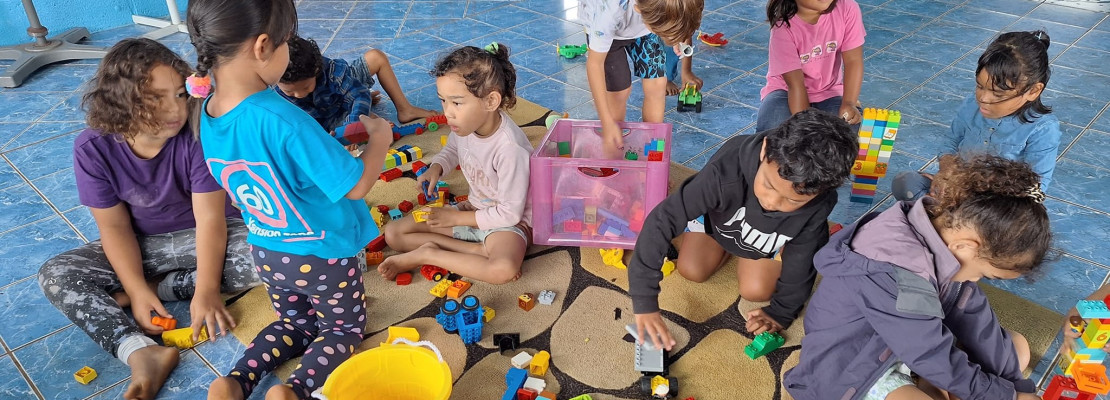Early Childhood is “a period of momentous significance for all people growing up in our culture… By the time this period is over, children will have formed conceptions
of themselves as social beings, as thinkers, and as language users, and they will have
reached certain important decisions about their own abilities and their own worth.”
Donaldson, M., Grieve, R., and Pratt, C. Early Childhood Development and Education: Readings in Psychology. Oxford: Basil Blackwell, 1983, p.1.
“In the beginning God” is the fundamental beginning point for any Christian seeking to understand the meaning of life. This section of the curriculum introduces children to God as their Creator and as the One who gave them the gift of creativity.
However, while He is the Creator, He has also given to His creatures’ responsibilities – in this instance responsibility to care for that which He has made. This section explores how each child should care for the body and mind He has given.
“Study to show thyself approved by GOD, a workman that needeth not to be ashamed, rightly dividing the word of truth” 2 Timothy 2:15
Essential Learning Skills
The essential skills as outlines are based on the five strands and goals of the Cook Islands Apii Potiki Curriculum Framework.
COMMUNICATION SKILLS (INQUIRY (4))
• Develop non verbal communication skills fpr a range of purposes (S4/ GOAL 1)
• Develop verbal communication skills for a range of purposes (S4/ GOAL 2)
SELF MANAGEMENT, COMPETITIVE, WORK AND STUDY SKILLS ( IDENTITY (1), INVOLVEMENT (2) & CONTRIBUTION (5))
• They know the limits and boundaries of acceptable behavior (S1/ GOAL 3)
• Their emotional well being is nurtured (S2/GOAL 2)
• They know the limits and boundaries of acceptable behavior (S2/ GOAL3)
• The are affirmed as individuals (S5/ GOAL 2)
PHYSICAL SKILLS (INVOLVEMENT (2) & INQUIRY (3))
• Their health is promoted (S2/ GOAL 1)
• Their play is valued as meaning learning and the importance of spontaneous play is recognized (S3/ GOAL 1)
• They gain confidence in and control of their bodies (S3/ GOAL 2)
SOCIAL AND COOPERATIVE SKILLS (IDENTITY (1) & CONTRIBUTION (5))
• They know they have a place, they feel comfortable with the routines, customs and regular events (S1/ GOAL 2)
• They are encouraged to learn with and alongside others (S5/ GOAL 1)
• There are fair opportunities for learning, despite gender, ability, age, ethnicity, or background (S5/ GOAL 3)
PROBLEM SOLVING SKILLS (INQUIRY (3))
• They learn strategies for active exploration, thinking, and reasoning (S3/ GOAL 3)
• They develop working theories for making sense of the natural, social, physical and material worlds (S3/ GOAL 4)
NUMERACY SKILLS (COMMUNICATION (4))
• They experience the stories and symbols of their own other cultures (S4/ GOAL 3)
ARTISTIC AND CREATIVE SKILLS (COMMUNICATION (4))
• They discover different ways to be creative and express (S4/ GOAL 4)
INFORMATION SKILLS (IDENTITY (1) & INQUIRY (3))
• Connecting links with family, early learning center, community, society, country, wider world is affirmed and extended (S1/ GOAL 1)
• They learn strategies for active exploration, thinking, and reasoning (S3/ GOAL 3)
ECE PRINCIPLES FOR IMPLEMENTATION
LANGUAGE OF INSTRUCTION (Te Reo)
Aitutaki Maori language is the first language in this school and therefore used as the main language of instruction. English as a second language will also be used for instruction to our children in ECE regards to their first language experiences.
VALUES, CUSTOMS AND TRADITIONS, AND SPIRITUAL BELIEFS:
Values, attitudes and spiritual beliefs are a fundamental part of Tekaaroa Adventist School. The Cook Islands is a country of tradition and change, of traditional customs and ceremonies, and of western practices and laws. The Early Childhood curriculum will reflect Cook Islands values, customs, traditions and spiritual beliefs, as for this, it will reflect the Seventh-day Adventist beliefs.
FAMILY & COMMUNITY:
The wider world of family and community is an inclusive part of the early childhood education at Tekaaroa Adventist School. Local families, the community to the wider community are greeted for their visit to the centre and praised for their time. Our children need to have our families and community member’s attention and participation in their daily play base activities to grow and become citizens of our society and children for God.
HOLISTIC DEVELOPMENT:
The early childhood curriculum reflects the holistic way children learn.
RELATIONSHIPS:
Children learn through responsive and warm relationships with people, places and things.
EMPOWERMENT:
The Early Childhood curriculum will enable the child to learn and grow.
Inclusiveness
Te Api’i Tamariki Potiki curriculum is designed to be inclusive and appropriate for all children and anticipates that special needs will be met as children learn together in all kinds of Early Childhood settings. The programmes of each centre will incorporate strategies to fully include children with special needs.
